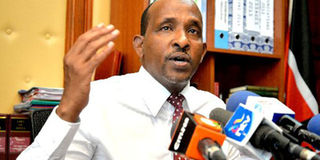Jubilee and Cord haggle over poll reforms panel

National Assembly Majority Leader Aden Duale at a media briefing at Parliament Buildings in Nairobi on April 14, 2016. Duale says that including two nominees from Jubilee and Cord coalitions in the electoral commission selection panel would be unconstitutional. PHOTO | SALATON NJAU | NATION MEDIA GROUP
What you need to know:
- Duale opposes proposal to have coalition nominees in team that will pick commissioners.
- Justice and Legal Affairs Committee and the Constitutional Implementation Oversight Committee had proposed that both Cord and Jubilee nominate two individuals each to the panel.
Jubilee and Cord are still haggling over the best method to pick a panel to choose members of the electoral commission.
National Assembly Leader of Majority Aden Duale is of the opinion that including two nominees from each coalition in the selection panel would be unconstitutional.
He said the move would subject the independent commission to manipulation by political players.
“Nominees by both coalitions will strive to ensure the interest of their parties are taken care of,” he said when he appeared before a joint House team.
Deputy Leader of Majority Naomi Shaban also represented Jubilee.
The joint team of the Justice and Legal Affairs Committee and the Constitutional Implementation Oversight Committee had proposed that both Cord and Jubilee nominate two individuals each to the panel.
The Cord leadership in Parliament is set to appear before the joint team on Thursday to give its views on the issue.
Cord has been insisting on a situation such as the Inter-Parties Parliamentary Group arrangement of 1997, where political parties play a role in the appointment of electoral commissioners, but Jubilee is of the opposite view.
SIX COMMISSIONERS
Mr Duale said the nomination of six commissioners by the Narc administration in 2006 and their subsequent disagreement with the former Electoral Commission of Kenya Chairman Samuel Kivuitu contributed to the 2008 post-election violence.
The joint team has invited the political parties as well as other stakeholders in a bid to seek their views on proposed electoral reforms contained in two draft laws—the IEBC (Independent Electoral and Boundaries Commission) (Amendment) Bill and the Constitutional of Kenya (Amendment) Bill.
Also in contention is a proposal by the joint team to extend the period for the Supreme Court to hear presidential petitions from 14 days to 30 days.
The Jubilee coalition said the period was too long and needed to be reduced to probably 21 days or remain at 14.
Mr Duale said the 30-day period was too long and was likely to intensify tension in case of contentious presidential poll results.
Kisumu West MP Olago Alouch had argued that a longer period was essential to give judges ample time to review all aspects of the case and give a well-thought-out decision.





